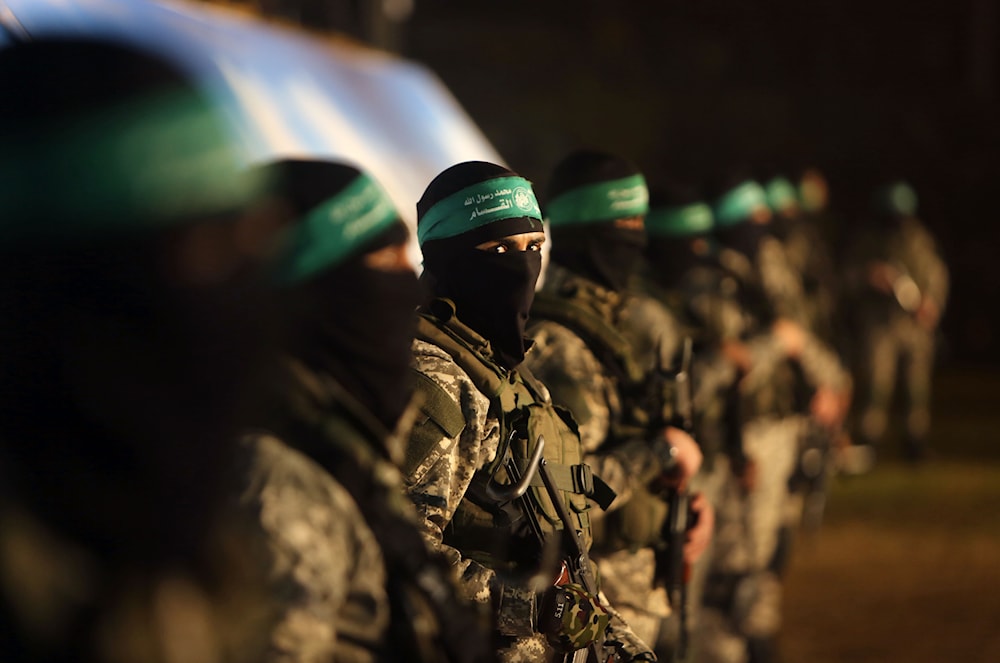Assassinations can't end Resistance, no image of victory for 'Israel'
An Israeli intelligence expert says that history has proven that the assassination of Resistance leaders only increases the groups' strength and determination.
-

Palestinian Resistance fighters of Hamas' al-Qassam Brigades take part in a gathering in Gaza City on January 31, 2016. (AFP)
Assassinating Resistance leaders has proven to be a failed policy to eliminate or defeat their groups, a piece published by Israeli newspaper Haaretz concluded.
Commenting on recent Israeli claims that they assassinated Hamas' senior leader Marwan Issa, Yossi Melman, an Israeli intelligence analyst, said that this course of action will not eliminate the movement, emphasizing that Hamas is deeply rooted in Palestinian society; in the West Bank, Gaza, Jordan, Lebanon, Syria, and even outside the Middle East.
He pointed out that the most common Israeli illusion is that "decapitation" will help "make the Palestinian problem disappear," a belief held by many, even in the security and military establishments.
Read more: Israeli forces failed on October 7, Halevi says amid new row
Israelis patting themselves on their back
With the brutal war on Gaza nearing the 6-month mark, the Resistance shows no signs that it will be "raising its hands" and surrendering, rather, it has continued its fight, the writer added.
Additionally, the movement's determination is evident in the fact that its fighters have managed to return to areas that the Israeli army claimed to have occupied in Gaza, most notably in the northern and central parts of the Strip.
On the other hand, the Israeli army intentionally exaggerates the ranks of Resistance leaders assassinated, or their position within their groups, aiming to pat itself on the back and inflate the extent of its success against Hamas.
Read more: 'Israel' wants prisoner swap without 'paying price': Resistance source
However, the reality on the ground is more complex, according to Melman, as the Resistance has inflicted many losses against the Israeli army in terms of soldiers and officers, with hundreds killed since the start of the invasion of Gaza and several thousands injured as well.
Moreover, there are "invisible" injuries, as many in the Israeli army suffer from post-traumatic stress disorders, which may manifest months or years after the end of the fighting, as per the piece.
Furthermore, it has been proven that one of the hypotheses that the occupation has been promoting, that senior Hamas leaders "hide with prisoners in tunnels to use them as human shields," is not true, Melman said.
Read more: Israeli forces execute 50 Palestinians in Al-Shifa, including children
No military victory
The Haaretz report added that for decades, many Israeli governments and security and military institutions have been "fond of using the method" of assassinations. However, the entity's top ministries, in addition to the security, military, and intelligence establishments, have "failed to formulate an assassination doctrine."
Melman affirmed that it must be remembered that assassinations "have a limited and short-term impact" in all cases. In this context, it referred to the assassination of Hezbollah leader Imad Mughniyeh in 2008 in the Syrian capital, Damascus, in a joint operation by Mossad and the CIA.
He also recalled the United States' assassination of IRGC's al-Quds Force commander, martyred General Qassem Soleimani, in Baghdad in 2020, pointing out that it "did not lead to a strategic shift, as Hezbollah and the Quds Force continue their work with strength and determination."
In light of this, the intelligence expert concluded that "Israel should not revel in assassinations... it must understand that they are not everything, and they are not a substitute for strategy."
Read more: 'Israel' lost the war against Hamas: Res. General Yitzhak Brik
The war on Gaza "will end without an image of victory for Israel, and even the assassination of Hamas leaders will not change this reality," Melman stressed.
"The only way to extricate Israel from the quagmire of Gaza is a multi-arena strategic political action," in Gaza and the West Bank within occupied Palestine, regionally in the Middle East, as well as on the international level.

 4 Min Read
4 Min Read








